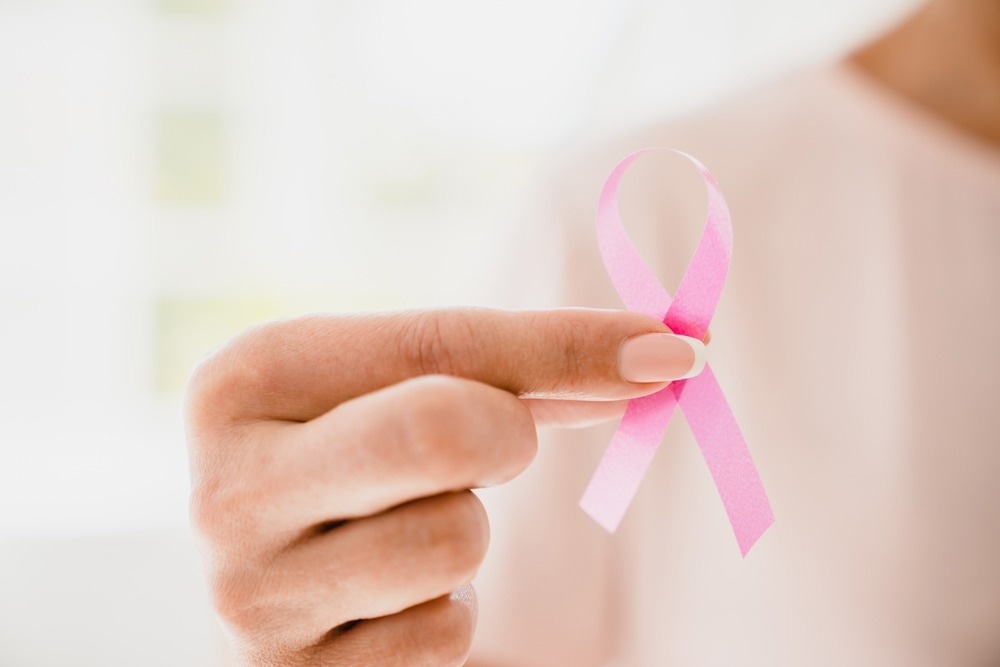Introduction
Biological mechanisms
Epidemiological evidence
Impact of breastfeeding duration and exclusivity
Influence of breastfeeding on different types of breast cancer
Global health implications
Challenges and barriers to breastfeeding
References
Further reading
Breastfeeding offers a remarkable benefit for mothers: a reduced risk of breast cancer. Studies suggest that the longer a woman breastfeeds, the lower her chances of developing this disease.

Image Credit: Krakenimages.com/Shutterstock.com
Introduction
Breastfeeding is widely recognized for its role in infant nutrition and development, but it also confers significant health benefits to the mother, particularly in reducing the risk of breast cancer.1
The act of lactation has been consistently linked to a lower incidence of breast cancer, with epidemiological evidence suggesting a dose-dependent relationship: the longer a woman breastfeeds, the more she may reduce her risk.1
This protective effect is attributed to hormonal changes that occur during breastfeeding, such as suppressed ovulation, which reduces a woman's exposure to estrogen.1
Some of the biological factors suggested to be involved include immunological modulation during breastfeeding, the differentiation of breast tissue, and the exfoliation of potentially damaged cells, which may help in preventing the development of cancer.1
Biological mechanisms
Emerging evidence suggests that epigenetics may be a key mechanism in the protective role of breastfeeding.2 DNA methylation, a process where a methyl group is added to DNA, can silence gene expression.2 One gene influenced by this process is FoxA1, which is essential for healthy breast tissue development.2
In breast cancer, FoxA1 is often silenced through hypermethylation.2 This can occur due to mutations in the tumor suppressor gene BRCA-1, which helps regulate FoxA1 methylation.2 Without proper BRCA-1 function, FoxA1 becomes hypermethylated, increasing breast cancer susceptibility.2
Breastfeeding appears to alter this epigenetic makeup.2 Women who breastfeed have been shown to exhibit lower levels of FoxA1 methylation, similar to the protective effect of a functional BRCA-1 gene.2 Breastfeeding also has a role in reducing pregnancy-associated plasma protein-A (PAPP-A) overexpression, a common feature in breast cancer.2
The BRCA1-IRIS, a distinct gene product of BRCA-1 that acts as an oncogene, also contributes to breast cancer development, with breastfeeding duration emerging as a key modulator.3 IRIS is crucial for mammary cell growth during pregnancy. Still, its overexpression can fuel aggressive breast cancers, such as triple-negative breast cancer (TNBC).3
Nonetheless, prolonged breastfeeding suppresses IRIS expression and promotes the clearance of potentially cancerous cells.3 Conversely, insufficient breastfeeding may allow IRIS-overexpressing cells to persist, increasing cancer risk.3
This protective effect is further amplified by lactation's influence on hormone levels and the immune system. Prolactin, stimulated by breastfeeding, suppresses estrogen, a hormone linked to Hormonal Receptor positive breast cancer (HR-positive).1
Additionally, breast milk delivers a potent mix of modulators, including immune cells, antibodies (e.g., SIgA), and cytokines, potentially bolstering immune surveillance within breast tissue.1 For example, alpha-lactalbumin and oleic acid found in breast milk have been shown to induce apoptosis in tumor cells.
The cyclical process of lactation and involution, characterized by tissue remodeling and the expression of p53, c-myc, and BCL-xl genes, may further contribute to eliminating precancerous cells and reinforcing genomic integrity.2
Epidemiological evidence
Epidemiological studies have consistently shown a correlation between breastfeeding and a reduced risk of breast cancer.
According to a collaborative analysis of data from 47 epidemiological studies conducted in 30 countries, the risk of breast cancer dropped by 4.3% for every 12 months of breastfeeding, in addition to a 7.0% reduction for each birth.4
However, another study revealed that parity increases the risk of HR-negative. Still, parous women who breastfed had a lower risk of this type of cancer compared to those who never breastfed.5
Notably, the protective effect of breastfeeding seems to be consistent across developed and developing countries4. However, disparities exist among ethnic groups. Black and Hispanic women have higher mortality rates from breast cancer compared to non-Hispanic white women and are less likely to breastfeed.6

Image Credit: Inside Creative House/Shutterstock.com
For example, black women who are particularly affected by aggressive types of cancer also have a lower breastfeeding initiation rate (69.4%) compared to other racial groups.7 This has been linked to the fact that approximately 70% of black mothers are the primary economic support of their families, making them return to work shortly after birth.7
Impact of breastfeeding duration and exclusivity
Breastfeeding has been consistently associated with a decreased risk of breast cancer, with longer durations of lactation providing greater protection. The threshold effect observed in different studies indicates that a significant reduction in breast cancer risk is achieved after a cumulative breastfeeding duration of 6 months.8
Bad practices or limitations in breastfeeding can increase the risk of developing breast cancer.9 These include early cessation of breastfeeding, not breastfeeding exclusively for the recommended six months8, and abrupt involution, which can lead to increased inflammation and ductal hyperplasia, both of which are risk factors for breast cancer.9
Does Breastfeeding Reduce Your Risk of Breast Cancer?
Influence of breastfeeding on different types of breast cancer
Breastfeeding's impact on breast cancer risk varies depending on the specific subtype. While giving birth, regardless of breastfeeding, appears to lower the risk of HR-positive, lactation itself doesn't seem to offer additional protection against it.5
However, breastfeeding demonstrates a significant protective effect against HR-negative, particularly the aggressive TNBC.5,10
Women who breastfed for at least a year had a 31% lower risk of TNBC, and this protective effect was even more pronounced among younger African-American women, with an 82% risk reduction observed in those who breastfed for six months or more.10
Global health implications
Current and future global policies to promote breastfeeding as a breast cancer prevention strategy encompass health guidelines, workplace support, and comprehensive policy packages.11-13
Health organizations advocate for exclusive breastfeeding for six months, yet implementation lags.11-13
The Global Breastfeeding Collective sets policy priorities, aiming for aligned family leave and diverse lactation support by 2030.11-13 Governments and the CDC enhance programmatic support, emphasizing the need for a unified approach to foster breastfeeding-friendly environments and address racial disparities in breastfeeding rates.11-13
Challenges and barriers to breastfeeding
Numerous obstacles prevent widespread breastfeeding success. The social stigma surrounding it, particularly in public spaces, creates a barrier, often influenced by cultural norms and lack of societal support.14
Insufficient training and support within healthcare systems, coupled with inadequate workplace accommodations, further hinder mothers.14
Misinformation regarding breastfeeding benefits, as well as physical challenges like pain or lactation difficulties, combined with psychological barriers, can impact women's decisions.14
To overcome these barriers, a multifaceted approach is required, focusing on healthcare provider training, improved workplace policies, public education campaigns, and community-based support systems.14
References
- Obeagu, E.I., and Obeagu, G.U., (2024). Exploring the profound link: Breastfeeding's impact on alleviating the burden of breast cancer – A review. Medicine 103, e37695. https://doi.org/10.1097/md.0000000000037695
- Chen, Y, et al. (2023). The role of breastfeeding in breast cancer prevention: a literature review. Frontiers in Oncology 13. https://doi.org/10.3389/fonc.2023.1257804
- Castillo P, et al. (2022). Novel insights linking BRCA1-IRIS role in mammary gland development to formation of aggressive PABCs: the case for longer breastfeeding. PubMed 12, pp.396–426.
- Breast cancer and breastfeeding: collaborative reanalysis of individual data from 47 epidemiological studies in 30 countries, including 50,302 women with breast cancer and 96,973 women without the disease, (2002). Lancet 360, 187–195. https://doi.org/10.1016/s0140-6736(02)09454-0
- Fortner R.T, et al.(2019). Parity, breastfeeding, and breast cancer risk by hormone receptor status and molecular phenotype: results from the Nurses' Health Studies. Breast Cancer Research 21. https://doi.org/10.1186/s13058-019-1119-y
- Sly J.R, et al. (2019). Knowledge of the Relationship Between Breastfeeding and Breast Cancer Risk Among Racial and Ethnic Minority Women. Journal of Cancer Education. 35, pp.1193–1196. https://doi.org/10.1007/s13187-019-01580-9
- Echols A., (2023). The Challenges of Breastfeeding as a Black Person | ACLU. American Civil Liberties Union.
- Cordeiro B., (2014). Breastfeeding lowers your breast cancer risk [Online]. MD Anderson Cancer Center. Available at: https://www.mdanderson.org/publications/focused-on-health/breastfeeding-breast-cancer-prevention.h19-1589046.html#:~:text=In%20a%20study%20by%20the%20Collaborative%20Group%20on%20Hormonal%20Factors%20in%20Breast%20Cancer%20%2C%20researchers%20found%20that%20for%20every%2012%20months%20a%20woman%20breastfed%2C%20her%20risk%20of%20breast%20cancer%20decreased%20by%204
- Basree M.M, et al.(2019). Abrupt involution induces inflammation, estrogenic signaling, and hyperplasia linking lack of breastfeeding with increased risk of breast cancer. Breast Cancer Research 21. https://doi.org/10.1186/s13058-019-1163-7
- Ma H, et al. (2017). Reproductive factors and the risk of triple-negative breast cancer in white women and African-American women: a pooled analysis. Breast Cancer Research 19. https://doi.org/10.1186/s13058-016-0799-9
- Safety N. and F., (2019). Global breastfeeding scorecard, 2019: increasing commitment to breastfeeding through funding and improved policies and programmes [Online]. Available at: https://www.who.int/publications/i/item/WHO-NMH-NHD-19.22
- Team C., (2024). 3 strategies to break down barriers to breastfeeding and lower women's risk of breast cancer [Online]. UCLA Center for Health Policy Research. Available at: https://healthpolicy.ucla.edu/newsroom/blog/3-strategies-break-down-barriers-breastfeeding-and-lower-womens-risk-breast-cancer#:~:text=Additionally%2C%20only%2027%25%20reported%20exclusive%20breastfeeding%20through%20their%20child%E2%80%99s%20first%20six%20months%20and%20by%2012%20months%2C%20only%2044%25%20reported%20any%20breastfeeding
- CDC. (2020) Breastfeeding for Cancer Prevention. [Online] Blogs, CDC. Available at: https://blogs.cdc.gov/cancer/2019/08/01/breastfeeding-for-cancer-prevention/#:~:text=What%20is%20CDC%20doing%20to%20increase%20breastfeeding%20rates%20in%20the%20United%20States%3F%20CDC%20supports%20breastfeeding%20by%20tracking%20how%20long%20babies%20are%20breastfed%2C%20promoting%20best%20practices%20in%20health%20care%20settings%2C%20and%20supporting%20mothers%20at%20work%20and%20in%20communities
- Barriers to Breastfeeding: Supporting Initiation and Continuation of Breastfeeding [Online], n.d. ACOG. Available at: https://www.acog.org/clinical/clinical-guidance/committee-opinion/articles/2021/02/barriers-to-breastfeeding-supporting-initiation-and-continuation-of-breastfeeding#:~:text=Policies%20that%20protect%20the%20right%20of%20a%20woman%20and%20her%20child%20to%20breastfeed%20in%20public%20and%20that%20accommodate%20milk%20expression%2C%20such%20as%20insurance%20coverage%20for%20breast%20pumps%2C%20paid%20maternity%20leave%2C%20on%2Dsite%20childcare%2C%20break%20time%20for%20expressing%20milk%2C%20and%20a%20clean%2C%20private%20location%20for%20expressing%20milk%2C%20are%20essential%20to%20sustaining%20breastfeeding
Further Reading
Last Updated: Jun 13, 2024